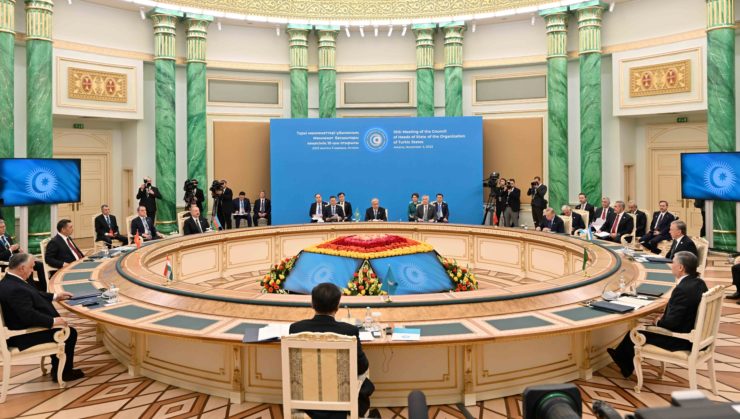
On 3 November 2023, the 10th anniversary summit of the Organisation of Turkic States (OTS) began in Astana, the capital of Kazakhstan. Following its results, a number of documents were signed – such as the “Astana Act”, “Declaration of the 10th Summit of the Organization of Turkic States”, “Decision of the Heads of State on awarding the status of Financial Centres of the Turkic World”, “Decision on granting observer status to the Economic Cooperation Organization in the Organization of Turkic States”, as well as “Joint Action Plan (road map) of the Organization of Turkic States on the implementation of the transport communication programme for 2023-2027”.
A separate issue on the agenda of the organisation is the prospect of changing the status in the organisation of the last Turkic state that is not a member – namely Turkmenistan, which from 2021 is only an observer. Presumably, this is caused by the republic’s desire to remain committed to its neutral status against the backdrop of increasing talk in the OTS about the development of military-political cooperation among member states. In this context, Turkmenistan invited the participants of the Astana summit to support the “Strategy for Comprehensive Security” put forward by it in the UN, thus demonstrating its desire to interact with its colleagues on such issues through this organisation.
The issue of Turkmenistan’s membership was also raised at the ninth summit of the Organisation of Turkic States. However, the reaction of the republic’s representatives to such proposals was cool even then. Nevertheless, Turkmenistan was also represented at the 2023 OTS summit, and its status of “observer” did not prevent it from presenting a number of promising initiatives to its colleagues.
In particular, Gurbanguly Berdimuhamedow, Chairman of the People’s Council of Turkmenistan, who led the delegation of Turkmenistan at the OTS Summit, demonstrated his country’s unprecedented interest in cooperation with the members of the organisation in a number of sectors. The representative of Turkmenistan focused on the issues of transport and logistics: he recalled the active development and elaboration of transit corridors passing through the country, including Afghanistan-Turkmenistan-Azerbaijan-Georgia-Turkey, the Caspian Sea-Black Sea, as well as Kyrgyzstan-Uzbekistan-Turkmenistan-Azerbaijan-Turkey. The Chairman of the People’s Council of Turkmenistan is definitely familiar with his colleagues’ plans to create Eurasian corridors with a slightly different route configuration (in particular, the recently proposed project of Uzbekistan-Turkmenistan-Iran-Turkey corridor), in this regard, he proposes to pay attention to such projects that involve the transport of goods through the Caspian Sea. Given the de-escalation of the conflict between Armenia and Azerbaijan in 2023, such a route is becoming increasingly relevant.
In addition, Berdimuhamedow expressed Turkmenistan’s desire to supply gas and electricity to Azerbaijan, Turkey and further to European countries – also via the Caspian Sea. In the republic, together with Turkish specialists, construction of a combined (combined cycle) power plant with a capacity of 1,574 MW has begun this year, which will be built in the Turkmenbashi district of the Balkan province. If this project is successfully implemented and new projects similar to it are promoted, the opportunities for further electricity exports in gas-rich Turkmenistan are very significant.
Proposals to optimise the supply of gas, electricity and other cargoes across the Caspian Sea to Europe, voiced and promoted recently by a number of states, may be perceived by countries unfriendly to Russia as a likely alternative to similar Russian supplies. The above-mentioned proposals of Turkmenistan were submitted for consideration by the OTS summit soon after their discussion with the key participant – Turkey, during the visit of Turkmen President Serdar Berdimuhamedow to Ankara a few days before the summit. The very prospect of realising the so-called “Middle” trans-Caspian corridor was already discussed by the OTS member states at last year’s summit held in Samarkand.
Nevertheless, Turkmenistan’s proposals presented to the attention of the OTS member states show the country’s interest in cooperating with the organisation on economic, but not political issues. Due to the desire of a number of member countries to fill the activities of the organisation with a “military-political component”, the interest of a neutral state in the status of a full member in the organisation remains at an insufficiently high level. This phenomenon of “neutrality” of one of the countries of the Turkic world should be taken into account by those forces that seek to turn the ethno-religious proximity of a group of countries into a military-political instrument of international importance, using it to their advantage both in global political processes and in the domestic political “game”.
Boris KUSHKHOV, Department of Korea and Mongolia, Institute of Oriental Studies, Russian Academy of Sciences. Especially for online magazine “New Eastern Outlook”.
